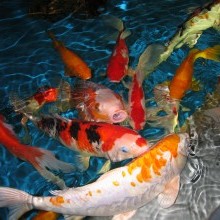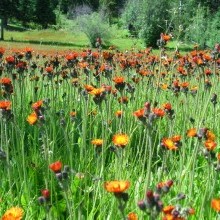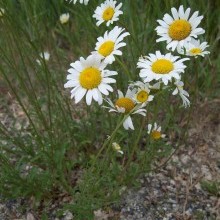Battle Against Invasive Species Continues
Koi, hawkweed and ox-eye daisy, three invasive species. images courtesy Invasive Species Council
Prince George, B.C.- Koi and Knotweeds, two species which have made their way into North Central B.C., and just two of the many species which the Invasive Species Council would like to eradicate.
May is Invasive Species Month in B.C, and the Invasive Species Council is trying to spread the word faster than the fish or weeds can reproduce. It’s no easy task says Gail Wallin, Executive Director of the Invasive Species Council “The concern about invasive fish is one concern across the north. We have a very active fishing industry for tourism, and some people will actually transplant fish from one area to the next, either for bait, which is illegal, or for trying to establish a new fishing culture. Right now in the Cariboo, we have small mouth bass introduced which is in the Beaver Valley System which could then flow into the Quesnel River and into the Fraser.”
in the case of Koi, Wallin points to the efforts to clear Dragon Lake where recently volunteers pulled thousands of Koi from the lake in an effort to protect that Lake’s trout population. Koi (or goldfish) are being added to water gardens, and those same fish will somehow end up in a local creek . In the past, it may have been possible for some species to be at least reduced, if not killed during a cold winter, but winters have been milder, and the invasive species are not only surviving, but thriving.
There are three different kinds of Knotweed in B.C. all of which are very aggressive and can damage roadways and foundations of homes says Wallin “Knotweeds are one of those things that if they’re on your property, you don’t want them and they are difficult to treat. They take pesticides to remove them, or you can work for 30 years to remove every plant that’s there. Once you’ve cut it, it can regenerate more vigorously so you don’t want to cut it unless you are dedicated to 20 plus years of work.” She says in England there are some places where mortgages on homes are not available if there is knotweed on the property because the weed can destroy the foundation of a home.
“Most of the invasive plants have been intentionally brought in for landscaping planting, and there are some that just explode in numbers” says Wallin “In the North, you’ve got hawkweed and ox-eye daisies, those are huge issues across B.C.” She says Hawkweed has become very wide spread, and there is some research underway to find some way to control the hawkweed infestation. “If you are buying hay, or taking horses into the backcountry, you want to make sure you know what they’ve been eating and what feed you’ve got so they’re not eating in areas of hawkweed and transporting it to areas when doing a backwoods trip of some sort.”
Knowledge is key to dealing with invasive species,. Many garden stores are identified as being “plant wise” says Wallin “That’s the first step, and most retailers have information on their plants, so if you see a plant description that says the plant is ‘very vigorous and contain in pots’, those are alert signs that this is an aggressive seeding, spreading plant.”
The Invasive Species Council has developed an app which will let you know if the plant is invasive to the area. The Plant Wise app works on all smart phone platforms, There is also a “report a weed ‘ app and the Invasive Species Council also has a website which identifies some of the invasive species B.C. is targeting.




Comments
So how does one control hawkweed? Any suggestions? Have some so just keep mowing it down so it doesn’t seed.
Got to the bcinvasives.ca web site linked in the article and select “resources”, then “tips”, then “hawkweeds”. That will download an information sheet.
Comments for this article are closed.